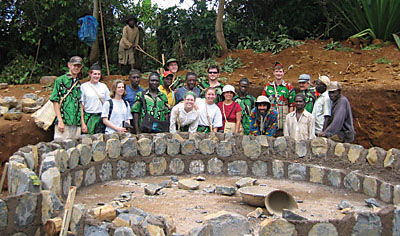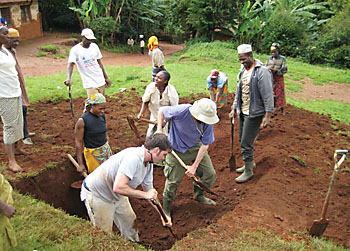 | The Yale Engineers Without Borders team in Kikoo is pictured here with local masons behind the partially completed water storage tank. |
Yale
senior Nick Del Vecchio spent days of his summer break digging trenches beneath
the sweltering sun in the African country of Cameroon, but what he most remembers
of his time there is the celebration of water that rewarded his labors. — By Susan Gonzalez
T H I S
Engineering lessons get real-world application in Cameroonian water project
Del Vecchio was one of five Yale students who traveled to Africa to take part
in a project, led by the Yale chapter of Engineers Without Borders (EWB-YSC),
to create a sustainable source of clean water in the Cameroonian village of Kikoo,
an economically poor community that has no running water or electricity. At the
end of the group’s stay in the village, he and the other members of the
Yale team observed the villagers’ excitement as they watched water flow
from a pipe near a then-unfinished water storage tank, reminding them of the
preciousness of a resource they often take for granted back home.
Del Vecchio serves as president of EWB-YSC, which was founded in 2004 by Yale
undergraduates and William Mitch, an assistant professor of chemical engineering,
to provide engineering students with opportunities for hands-on training while
also contributing to a worthy cause. In Cameroon, the Yale students were able
to put into practice some of the concepts they have learned in their classes
as they discovered for themselves the challenges faced by developing countries
with regard to creating a sanitary water supply.
The Yale team spent two-and-a-half weeks in Cameroon helping the Kikoo villagers
build a water distribution system that the students had designed throughout the
academic year. The community of Kikoo has traditionally obtained water from polluted
streams that lie at the bottom of large valleys, where they wash clothes and
bathe. These streams are often contaminated as a result of these activities and
nearby animal grazing, according to Del Vecchio.
“While the stream water can be used to wash clothes or to bathe, it is
not healthy to use as drinking water,” he says. “In Kikoo, everyone
suffers from the effects of gastrointestinal illnesses, which are second to AIDS
as a major health problem there. One of our goals was to improve the health of
villagers by creating a clean water supply.”
The Kikoo community began its association with EWB-YSC after an American missionary
working in the area applied for assistance on the water project through the national
Engineers Without Borders, a non-?profit humanitarian organization that partners
with developing countries throughout the world in order to improve their citizens’ quality
of life, particularly through sustainable engineering projects. The Yale chapter
offered to help with the task.
Student members of EWB-YSC had already gained some experience with an international
project in 2005, when they designed and built a new water system in the village
of El Rosario, Honduras, which was experiencing a water shortage. The students
identified the cause of the shortage and made improvements to the system that
both helped provide more water to the town and eliminated unnecessary water loss.

Yale students Nick Del Vecchio (foreground) and Joshua Knight (purple shirt) dig out the foundation for the water tank they helped design and develop for the village of Kikoo in Cameroon.
For the Kikoo project, the students’ goal was to design a gravity-fed system
that features a sealed spring water catchment box (which dams the water coming
from a natural spring), a concrete storage tank that would hold the water, and
a network of pipes to distribute the water to about a dozen publicly accessible
water taps at prominent village sites, such as a church and a school. The Kikoo
villagers would then be able to fill containers of water to take back to their
homes.
EWB-YSC (which has about 10 active members) teamed up with two Cameroonian engineering
students, who helped with an assessment of the village’s needs, among other
things. In weekly chapter meetings held during the school year, the Yale students
learned about some of the practical issues of their project from Mitch, a specialist
on the disinfection of water, and from four local professional engineers who
serve as mentors to the group. The undergraduates also raised nearly $40,000
to cover the cost of the project, including travel to Cameroon and needed materials.
Two EWB-YSC members (now alumni) and one of the professional engineers traveled
to Kikoo in January to conduct an on-site assessment.
“In international endeavors in developing countries such as Cameroon, students
have the opportunity to see the entire spectrum of a project: from the technical
design to meeting with a local water committee to the finances,” says Mitch. “This
is very different from working on a local civil engineering project, where a
student might design one part of a system, such as a pump for a waste water treatment
plant, but would have no idea how the whole system works. In the Kikoo project,
the students were much more than a cog in the wheel.”
By the time the students arrived in Cameroon in the summer, the villagers had
begun some of the construction work for the project. Many of the residents joined
in to help the Yale students accomplish their top priority during their stay:
the construction of a 20,000 liter concrete storage tank.
The Kikoo townspeople literally chipped away at stone in local rock to make gravel
for the cement, which they then mixed by hand.
“I’ll never forget the image of seeing very old men filling buckets
with concrete, and of women with babies on their backs carrying the buckets to
the site,” says Del Vecchio. “I had a great time interacting with
the community members, getting down in the dirt and swinging shovels together
as we dug the trenches. It was wonderful to connect on this common ground, where
you don’t have to speak the same language but know you have the same goal.”
One of the challenges the Yale team faced was designing a system that took into
account the various elevation changes in Kikoo, which required them to think
carefully about such matters as the water pressure in pipes.
“I loved seeing all of our calculations emerge into a storage tank,” says
team member Alison Hoyt ’09. “I learned a lot from the discussions
between the Cameroonian technicians, engineering students and our professional
mentors as we discussed the pros and cons of system design details. It was fascinating
to see how engineering practices differ between the countries based on materials
available and local needs.”
In addition to the labor-intensive construction tasks, the Yale students also
traveled to a village school to talk to nearly 100 schoolchildren — some
of whom had never even heard of germs — about such public health issues
as hygiene and sanitation, topics that are critically related to a clean water
supply. To keep the schoolchildren’s interest, Yale students used hand
puppets and other visuals to make their points.
“One of the highlights of the trip for me was on the last day, when the
schoolchildren put on a presentation, with the help of the headmaster and some
teachers, about what they had learned,” says Jessica Jeffers ’09. “It
was so touching to see them explaining what germs are, how they affect you, why
you need to wash your hands and so on. It was really rewarding — having
that feeling that you have made a change is a beautiful one.”
Others who participated in the Kikoo project were Adam Bouland ’09, Lee
Christoffersen ’10 and professional engineers Azalea Mitch (a 2005 graduate
of the Yale School of Forestry & Environmental Studies and William Mitch’s
wife), Joshua Knight, David Gibson and Dave Sacco.
The Yale team now hopes to raise funds for the second phase of the project: to
expand the water distribution system (currently three public taps are in operation)
and to design and implement a secondary water system to serve parts of the village
not reached by the first phase, as well as to supply water to the nearby village
of Rovitangitaa. The group will work on the details of that design this year.
“We are looking at options now, and want to be able to make a trip back
to Cameroon this year, hopefully during spring break,” says Del Vecchio,
noting that this phase rests on the group’s continued success at fundraising.
All of the members of EWB-YSC were impressed by the beauty of Cameroon, a country known for its diversity (it features
forest, desert, mountains and rainforest), and they enjoyed learning some words
and phrases in Lamnso, the local language of Kikoo, as well as local customs.
Highlights for everyone in the group were the parties the villagers threw to
welcome the Yale team and, later, to thank them for their hard work. These featured,
among other activities, the performance of songs and dances.
“The people of Kikoo showed incredible appreciation to us for becoming
involved in their project, their community and their lives,” says Del Vecchio. “We’d
really like to continue that partnership.”
Jessica Jeffers will discuss the project in a talk on Friday, Nov. 16, 1-2 p.m.
in Rm. 102, Luce Hall, 34 Hillhouse Ave. The talk, sponsored by the Council on
African Studies of the MacMillan Center, is free and open to the public. Send
e-mail to carol.gallo@yale.edu by 11 a.m. on Nov. 15 to arrange for lunch, or
bring your own.
For more information about EWB-YSC or to contribute to its cause, visit www.yale.edu/ewb.
 W E E K ' S
W E E K ' S S T O R I E S
S T O R I E S![]()
 Todai-Yale venture to boost Japanese Studies in the U.S.
Todai-Yale venture to boost Japanese Studies in the U.S.![]()
![]()
 Yale dedicates $8 million Clean Room
Yale dedicates $8 million Clean Room![]()
![]()
 For some infants, mother’s milk can help increase IQ, says study
For some infants, mother’s milk can help increase IQ, says study![]()
![]()
 Engineering lessons get real-world application . . .
Engineering lessons get real-world application . . .![]()
![]()
 ENDOWED PROFESSORSHIPS
ENDOWED PROFESSORSHIPS
 Mark Ashton appointed the Jesup Professor of Silviculture
Mark Ashton appointed the Jesup Professor of Silviculture![]()
 Alicia Schmidt Camacho named Sarai Ribicoff Associate Professor
Alicia Schmidt Camacho named Sarai Ribicoff Associate Professor![]()
![]()
 School of Public Health launches new Advanced Professional . . .
School of Public Health launches new Advanced Professional . . .![]()
![]()
 Shareholder activist creates fund at Yale center for corporate governance
Shareholder activist creates fund at Yale center for corporate governance![]()
![]()
 Yale ceremony to commemorate Veteran’s Day
Yale ceremony to commemorate Veteran’s Day![]()
![]()
 Procrastination is not an option at Dissertation Boot Camp
Procrastination is not an option at Dissertation Boot Camp![]()
![]()
 Show features Chinese artist’s works of ‘Revolution and Rebirth’
Show features Chinese artist’s works of ‘Revolution and Rebirth’![]()
![]()
 IN MEMORIAM
IN MEMORIAM
 George Hersey: Wrote widely on art history and architecture
George Hersey: Wrote widely on art history and architecture![]()
 Eugene Waith: Expert on Elizabethan and Jacobean theater
Eugene Waith: Expert on Elizabethan and Jacobean theater![]()
![]()
 From the United Way: ‘A Tale of Guiding Young Fathers’
From the United Way: ‘A Tale of Guiding Young Fathers’![]()
![]()
 Program to look at company developing innovative . . .
Program to look at company developing innovative . . .![]()
![]()
 Campus Notes
Campus Notes![]()
Bulletin Home |
| Visiting on Campus
Visiting on Campus |
| Calendar of Events
Calendar of Events |
| In the News
In the News![]()
Bulletin Board |
| Classified Ads
Classified Ads |
| Search Archives
Search Archives |
| Deadlines
Deadlines![]()
Bulletin Staff |
| Public Affairs
Public Affairs |
| News Releases
News Releases |
| E-Mail Us
E-Mail Us |
| Yale Home
Yale Home